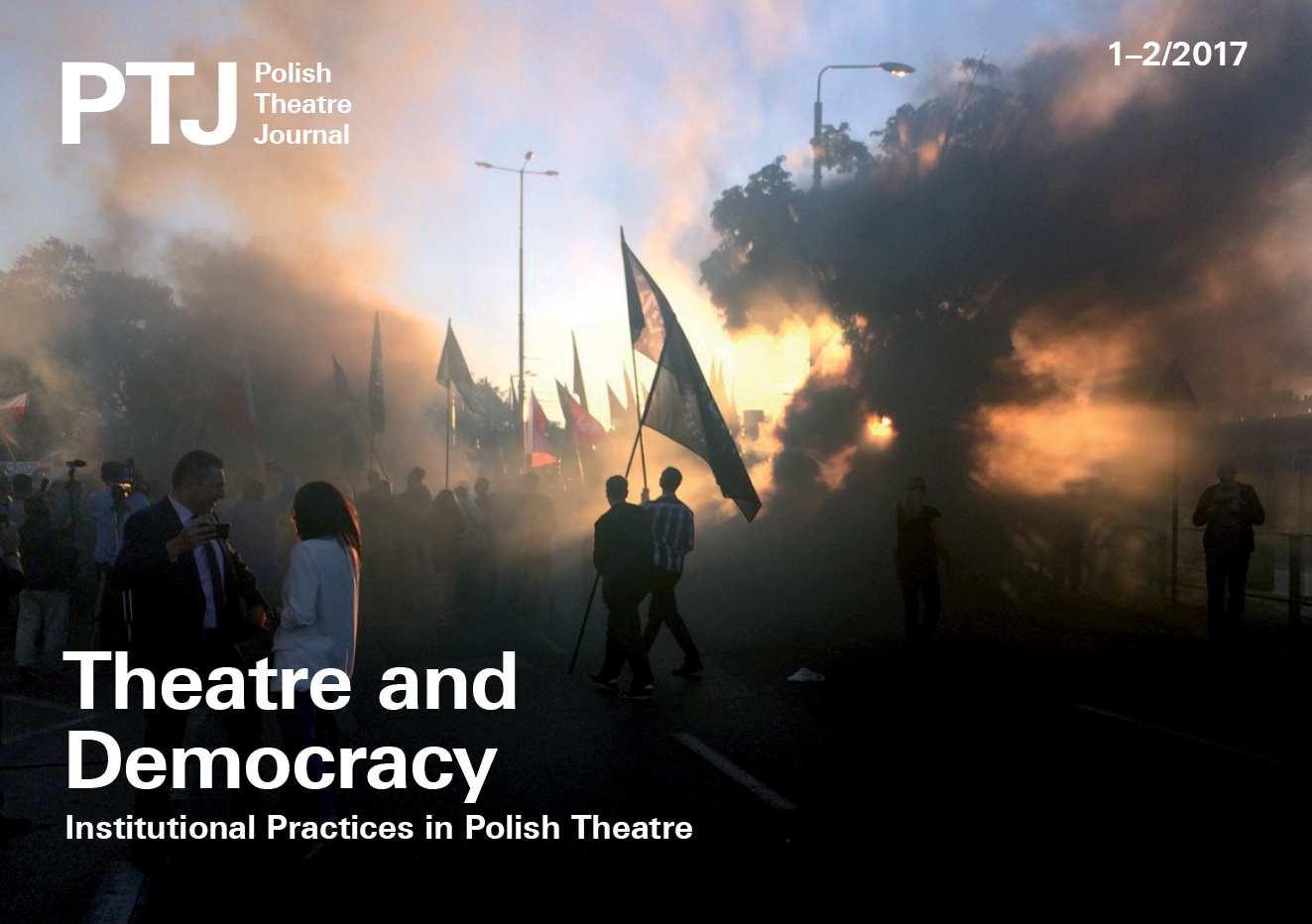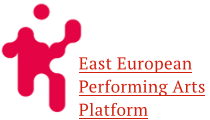East European Performing Arts Platform (EEPAP) supports the
development of contemporary performing arts (dance and theatre)
in 18 countries of Central and Eastern Europe.
Polish Theatre Journal - Theatre and Democracy: Institutional Practices in Polish Theatre

Demonstration at the Powszechny Theatre in Warsaw against The Curse, directed by Oliver Frljić, 19 May 2017. Photo credit: Marta Keil.
Polish Theatre Journal (PTJ) is an online English-language research journal examining contemporary Polish theatre and performance, which is published twice a year by the Zbigniew Raszewski Theatre Institute in Warsaw and the Department of Theatre Studies at the Aleksander Zelwerowicz National Academy of Dramatic Art in Warsaw.
From the introduction to the issue:
Culture is definitely one area of constantly escalating political conflict in Poland. It may even be that the conflict's true nature reveals itself here. The present project of national culture, reinforced by the government, has been designed to some extent as the eradication of public – or civic – culture in its many fundamental functions and essential features, including the programmatic autonomy of institutions and freedom from all forms of censorships, while fostering civil society and wide inclusiveness. According to unambiguous declarations by the current government, the role of national culture is to build an essential identity drawn from a narrative about the exceptional fate of a nation struggling against totalitarianism, which must lead to the turning of Polish society away from challenges of the globalized world deep in crisis, and towards a nationalistic isolationism.
That dynamic, dramatic process sets the perspective from which we look in this issue of PTJ at institutional practices in Polish theatre and in Polish performing arts, asking about the kind of institutions we need – especially in such times of grave crisis – and whether the current institutional model of the arts can efficiently contribute to the democratization of public life.
You can read Theatre and Democracy: Institutional Practices in Polish Theatre here.
Contents
INTRODUCTION
Agata Adamiecka-Sitek, Marta Keil
Theatre and Democracy. Institutional Practices in Polish Theatre
THE CURSE: WHO DOES PUBLIC THEATRE BELONG TO?
Paweł Łysak,Paweł Sztarbowski, Agata Adamiecka-Sitek, Marta Keil
Polish Theatre after Klątwa: Paweł Łysak and Paweł Sztarbowski, directors of the Powszechny Theatre in Warsaw, in Conversation with Agata Adamiecka-Sitek and Marta Keil
Oliver Frljić, Agata Adamiecka-Sitek, Marta Keil
Whose National Theatre Is It? Oliver Frljić in Conversation with Marta Keil and Agata Adamiecka-Sitek
Agata Adamiecka-Sitek
How to Lift the Curse? Director Oliver Frljić and the Poles
Paweł Mościcki
The Village Is on Fire! The Village Is Burning Down! Notes on the Oliver Frljić Production of Klątwa in Warsaw
THE SYSTEM: WHAT WE’VE GOT, WHAT WE NEED, WHAT WE CANNOT LOSE
Marta Keil
What Is the Purpose of Institutional Critique Today?
Paweł Płoski
Theatre Organization System in Poland
Dorota Buchwald
Institution: the Defence of Necessity
Weronika Szczawińska
Theoretical Democracies, Practical Institutions
Romuald Krężel
The Emancipated Artist
Marta Keil, Joanna Leśnierowska, Ramona Nagabczyńska, Maria Stokłosa, Mateusz Szymanówka
When Is Poland’s Sasha Waltz Going to Appear?: Joanna Leśnierowska, Ramona Nagabczyńska, Maria Stokłosa and Mateusz Szymanówka in Conversation with Marta Keil
Zofia Smolarska
Institutional Gastroscopy: Publicly Funded Theatre in Poland, Diagnosed by Its Craftspeople
OTHER INSTITUTIONS
Jan-Tage Kühling
On the Common Good: The Institution of the Chorus and Images of a Nation in Marta Górnicka’s Theatre
Kamila Paprocka-Jasińska
Can Centrala Save Us?
Arkadiusz Gruszczyński (ed.)
How Komuna Otwock became Komuna// Warszawa: A Conversation with Alina Gałązka, Grzegorz Laszuk and Tomasz Plata
Zofia Dworakowska
The ‘Open Activity Academy’, or: On Akademia Ruchu Centres
SUBJECTIVITY – RESISTANCE - DEMOCRACY
Igor Stokfiszewski
Beyond Participation
Monika Kwaśniewska
The Actor in the Deadlock of Contemporary Folwark Relations
Zofia Smolarska, Justyna Sobczyk, Justyna Lipko-Konieczna
Dismantling Our Own Language: Justyna Lipko-Konieczna and Justyna Sobczyk in Conversation with Zofia Smolarska
Ewa Majewska
Censorship as the Formative Mechanism of Neoliberal Culture?: The Productive Function of Prohibition
Igor Stokfiszewski
The Workers’ Movement in the Campaign for Democratizing Culture and for Political Democracy
THE INSTITUTION OF A FESTIVAL
Marta Keil
The Institutional Practices of a Festival
Ewa Guderian-Czaplińska
Demolishing Partition Walls: ‘Auto-theatre’ at the 2016 Theatre Confrontations Festival in Lublin
BATTLES FOR INSTITUTIONS – WARS FOR CULTURE
Andrea Tompa
And the Winner Is…Appointing Artistic Directors in Hungary
Henrike Kohpeiss
Who Wants a Theatre Company and Doesn’t Have One?
THE PEOPLE’S THEATRE
Maciej Nowak
We, The New Public Theatre
Ewa Bal
On the ‘People’s Theatre’: a Glance Back
Piotr Olkusz
The Pope’s New Clothes: Jean Vilar’s Lay Religion and Popular Theatre
Source:
